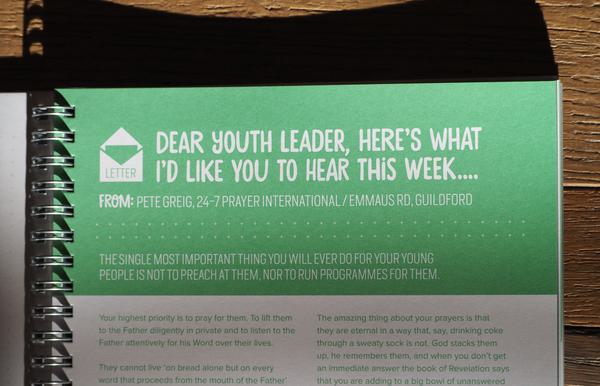With "normal" life so disrupted, how can we create helpful rhythms in our lives? Martin Saunders looks to ancient spiritual practices.
While a few outliers might be thriving in the current period of social isolation and self-imposed house arrest, most of us are finding it a complicated and difficult readjustment. The regular framework by which we carried out and understood our lives has been swept away; most of us no longer wake up and do the thing we used to do in the morning: take the bus, walk to school, head to the coffee shop. Our markers and cues for daily living have been replaced by a swirling mass of emptiness, and for some of us, chaos. In this new, unplanned and unmeasured version of life, it’s hard to know whether we’ve had a good day or not; whether we can feel a sense of accomplishment that the day has been well-lived.
For some - but not all - of us, what’s needed right now is a new structure. We need a new kind of routine, or framework, for this period of social distancing and staying at home. And one helpful tool which we might seek to borrow from is the monastic idea of a Rule of Life.
Our markers and cues for daily living have been replaced by a swirling mass of emptiness, and for some of us, chaos. It's a new, unplanned and unmeasured version of life...
Originating from the writings of St Benedict, but more recently popularised by a wave of writers from Fr. Christopher Jamieson to John Mark Comer, a Rule of Life is simply a pre-agreed structure for Christian living. We get to set the boundaries of it ourselves, and then we attempt to live up to our own expectations - an exercise in personal goal-setting and then self-control.
There have been many takes on the Rule of Life - and Google is your friend if you want to explore more. But one really helpful modern perspective comes from writer and church leader Ken Shigematsu, whose book ‘God in my Everything’ is a workbook for creating a Rule of Life. He argues that there are three key categories for thinking about our lives - how we Reach Out (the things we do which impact the world), how we Relate (our connections with others), and how we Restore (the things we do for ourselves). He also proposes three key spiritual practices which should flow through all of these things - Sabbath or rest, Prayer, and ‘Sacred Reading’ (connecting with Scripture). So to recap simply: three broad areas of life, and three key practices to enable them.
You may find these helpful as you then begin to think about the key elements which you want every day to include - the things you’ve decided will be part of your locked-down life. We’ll look at each of Shigematsu’s areas in turn, and consider some - but far from all - of the things that we might decide to add to our individual list. A note of encouragement/warning though: don’t try to set too many rules for yourself. One or two from each list would be plenty(!) - and you might not want to introduce them all at once.
Reach out (including work)
- Where and when will you work (if you’re able)? How will you signify to yourself and others that you have stopped work?
- How will you approach tasks in a way that won’t overwhelm you?
- How can you continue to share your Christian faith with others during lockdown?
- What can you do to ensure your lifestyle still models and promotes justice?
Relate (including friendship and family)
- How could you stay connected with friends?
- What can you do to build encouragement of others into your daily rhythm, perhaps through social media?
- What will it look like for you to remain engaged in a church community in this time?
- How will you remain connected with, support and check in on, your family?
- What practices or rhythms of prayer will you develop during this time?
Restore (including body and recreation)
- When and how will you take physical exercise each day? How else will you look after your body?
- What time will you wake up, and when will you go to bed?
- How are you using your money?
- When and how will you make space to hear or read the Bible?
Again, the great danger is that you can end up feeling overwhelmed by a list of things that you should be doing - and that’s certainly not the point. But making some decisions about the rules and boundaries that you might set for yourself, perhaps by choosing to answer some of the questions on these lists, may be really helpful in creating a new shape for this unexpected new way of living.
To give you an idea of what that could look like, let me share my own current Rule of Life with you. It’s shaped around my own personality and situation, so I wouldn’t suggest you just copy it, but hopefully, it demonstrates the concept in practice (including the fact that it doesn’t need to be very long):
- Read Scripture for at least five minutes each day, and then pray
- Drink two litres of water
- Work from 8am-4.30pm, with a lunch break
- Take one task at a time, and don’t check phone/social media between tasks
- Put the laptop away, and take a walk with my family at 4.30pm each day
- Write an encouraging note to someone every day
I hope this entirely unremarkable list inspires you (in a weird sort of way) that this doesn’t need to be complicated or hard. Hopefully, you can appreciate how even this short list of self-imposed rules helps me to stay mentally and physically well. I hope this might also be a helpful tool for you as you seek to navigate the next few weeks, and perhaps also afterwards. The Rule of Life has been central to many Christians’ practice since around the seventh century - I think it continues to have something profound to offer us today.







